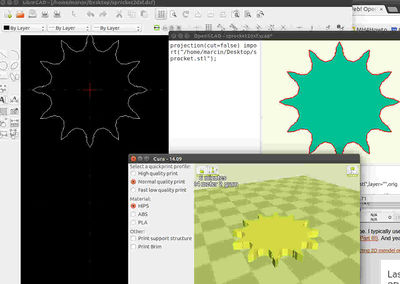OpenSCAD 101: Difference between revisions
Jump to navigation
Jump to search
No edit summary |
|||
| Line 3: | Line 3: | ||
*Exporting DXFs - [http://rasterweb.net/raster/2012/07/16/openscad-to-dxf/] - essentially - load and flatten, then export DXF | *Exporting DXFs - [http://rasterweb.net/raster/2012/07/16/openscad-to-dxf/] - essentially - load and flatten, then export DXF | ||
:*Note: stock Export DXF does not work for 3D files - they need to be projected first. | :*Note: stock Export DXF does not work for 3D files - they need to be projected first. | ||
::*To project - projection(cut=false) import("sprocket.stl"); | |||
:*Sample file for exercise in OpenSCAD - the sprocket STL and the .scad file that loads the STL and does a 2D projection. Note that the directory must be correct. [[File:sprocketexample.zip]] | :*Sample file for exercise in OpenSCAD - the sprocket STL and the .scad file that loads the STL and does a 2D projection. Note that the directory must be correct. [[File:sprocketexample.zip]] | ||
:*Note: original srocket was generated using [[Parametric Sprocket Generator]] using sprocket(12,5,7.5,8,0.2); | :*Note: original srocket was generated using [[Parametric Sprocket Generator]] using sprocket(12,5,7.5,8,0.2); | ||
Revision as of 02:28, 2 July 2015
Exporting DXFs from 3D Objects
- Exporting DXFs - [1] - essentially - load and flatten, then export DXF
- Note: stock Export DXF does not work for 3D files - they need to be projected first.
- To project - projection(cut=false) import("sprocket.stl");
- Sample file for exercise in OpenSCAD - the sprocket STL and the .scad file that loads the STL and does a 2D projection. Note that the directory must be correct. File:Sprocketexample.zip
- Note: original srocket was generated using Parametric Sprocket Generator using sprocket(12,5,7.5,8,0.2);
